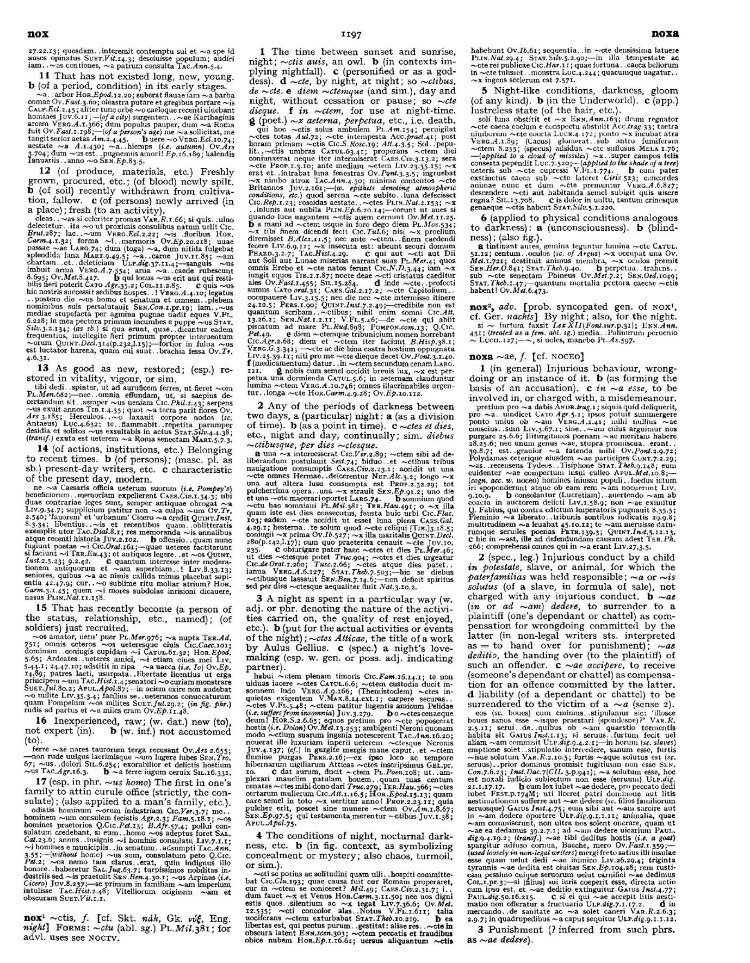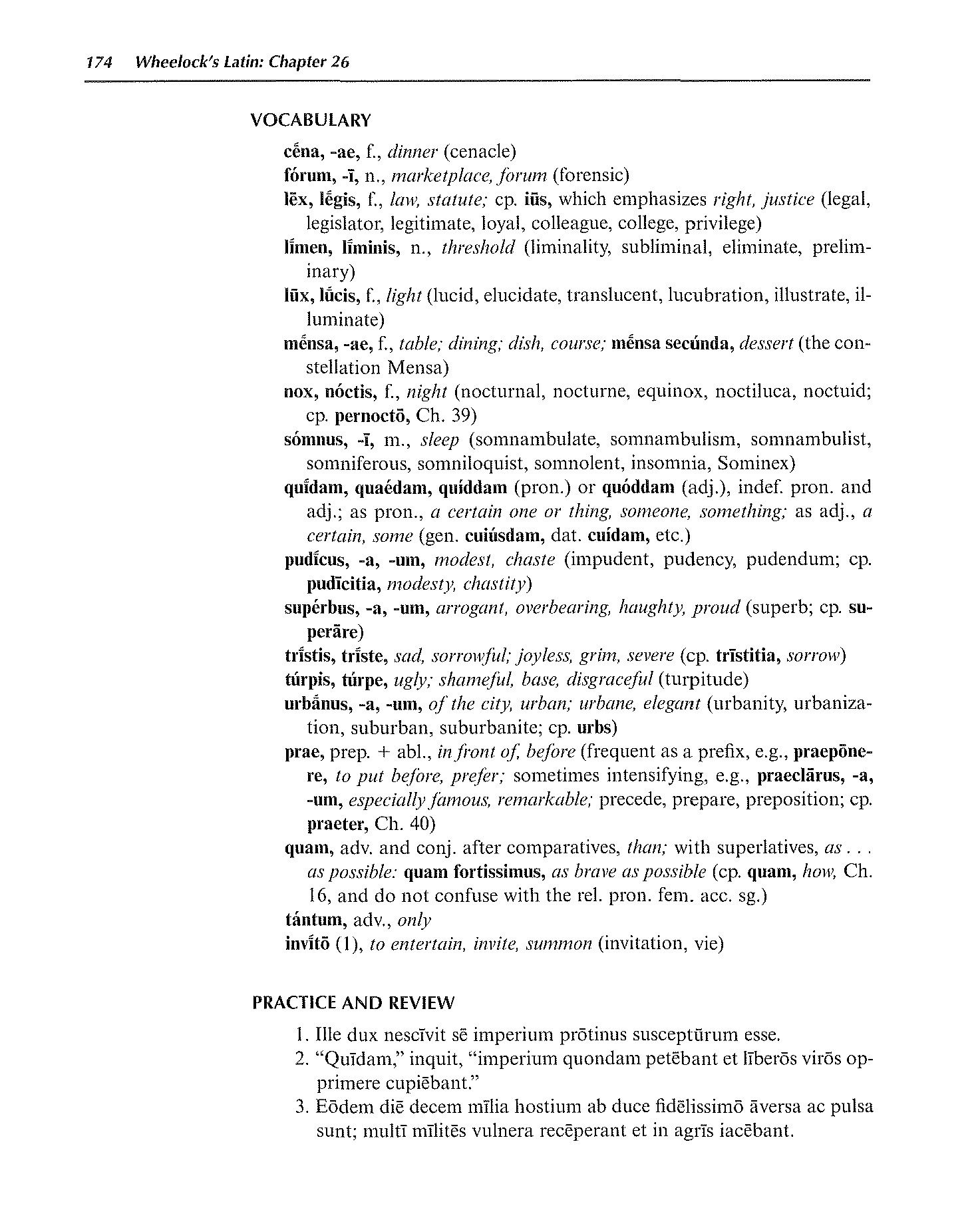
page_listing.tpl
page_subListingDetails.tpl
sub_listingDetails_style1.tpl
sub_listingDetails.title.tpl
nox night
nox is a Latin Noun that primarily means night.
Definitions for nox
Wheelock's Latin
Noun
- 1
night
English derivatives:
nocturnal nocturne equinox noctiluca noctuid
Oxford Latin Dictionary
Noun
- 1
The time between sunset and sunrise, night; ~ctis auis, an owl. (b) (in contexts implying nightfall). (c) (personified or as a goddess). (d) ~cte, by night, at night; so ~ctibus, de ~cte. (e) diem ~ctemque (and sim), day and night, without cessation or pause; so ~cte dieque. (f) in ~ctem, for use at night-time. (g) (poet.) ~x aeterna, perpetua, etc., i.e death.
- 2
Any of the periods of darkness between two days, a (particular) night: (a) (as a division of time). (b) (as a point in time). (c) ~ctes et dies, etc., night and day, continually; sim. diebus ~ctibusque, per dies ~ctesque.
- 3
A night as spent in a particular way (w. adj. or phr. denoting the nature of the activities carried on, the quality of rest enjoyed, etc.). (b) (put for the actual activities or events of the night); ~ctes Atticae, the title of a work by Aulus Gellius. (c) (spec.) a night's lovemaking (esp. w. gen. or poss. adj. indicating partner).
Adverb
- 1
By night; also, for the night.
Sentences with nox
Latin to English
Eā nocte profectus, Caesar ad quandam īnsulam clārissimam vēnit.Compare Having set out that night, Caesar came to a certain very famous island.
Nobi cum semel occidit brevis lux, nox est perpetua una dormienda.Compare For us when once our brief light has set, one eternal night must be slept.
Dies et nox, tamquam avis ille, mare prospecto, evolo cupio.Compare All day and night, like that bird, I look forth on the sea, and desire to fly away.
Declension table for nox
Cactus2000
| Singular | Plural | |
| Nom. | nox | noctēs |
| Gen. | noctis | noctium / -um |
| Dat. | noctī | noctibus |
| Acc. | noctem | noctēs / -īs |
| Abl. | nocte | noctibus |
Data sources
Notes
- Definitions
- Frederick M. Wheelock, Wheelock's Latin, 6th ed., rev. Richard A. LaFleur (New York, NY: HarperCollins Publishers, 2005): 174.
- P. G. W. Glare, Oxford Latin Dictionary, Vols. 1-8 (Oxford: Clarendon Press, 1982): 1197.
- Word frequencies
- Christopher Francese, "Latin Core Vocabulary," Dickinson College Commentaries, last modified 2014, http://dcc.dickinson.edu.
- Paul B. Diederich, The Frequency of Latin Words and Their Endings, PhD diss., (Columbia University, 1939).
- Louis Delatte, Suzanne Govaerts, Joseph Denooz, and Etienne Evrard, Dictionnaire fréquentiel et index inverse de la langue latine [Frequency Dictionary and Inverse Index of the Latin Language] (Liège, Belgium: Laboratoire d'analyse statistique des langues anciennes de l'Université de Liège [L.A.S.L.A.], 1981): 120.
Bibliography
Allen, Joseph H. Allen and Greenough's New Latin Grammar for Schools and Colleges: Founded on Comparative Grammar. Edited by James B. Greenough, George L. Kittredge, Albert A. Howard, and Benjamin L. D'Ooge. Boston, MA: Ginn & Company, 1903.
Crystal, David. A Dictionary of Linguistics and Phonetics. 6th ed. Oxford, UK: Blackwell Publishing, 2008.
Delatte, Louis, Suzanne Govaerts, Joseph Denooz, and Etienne Evrard. Dictionnaire fréquentiel et index inverse de la langue latine [Frequency Dictionary and Inverse Index of the Latin Language]. Liège, Belgium: Laboratoire d'analyse statistique des langues anciennes de l'Université de Liège (L.A.S.L.A.), 1981.
Diederich, Paul B. The Frequency of Latin Words and Their Endings. PhD diss., Columbia University, 1939.
Francese, Christopher. "Latin Core Vocabulary." Dickinson College Commentaries. Last modified 2014. http://dcc.dickinson.edu/latin-vocabulary-list.
Gildersleeve, Basil L., and Gonzales Lodge. Gildersleeve's Latin Grammar: Third Edition, Revised, and Enlarged. 3rd ed. London, England: Macmillan and Co., 1903.
Glare, Peter G.W. Oxford Latin Dictionary. Vols. 1-8. Oxford, England: Clarendon Press, 1982.
Krüger, Bernd. "Latin Conjugation Tables." Cactus2000. Accessed May 5, 2023. https://latin.cactus2000.de/index.en.php.
Pierson, Nick. "Sound of Text." Accessed October 26, 2019. https://soundoftext.com.
Wheelock, Frederick M. Wheelock's Latin. 6th ed. Revised by Richard A. LaFleur. New York, NY: HarperCollins Publishers, 2005.
Wiktionary Contributors. "Victionarium." Wikimedia Foundation, Inc. Updated March 18, 2019. https://la.wiktionary.org/wiki/Victionarium:Pagina_prima.
Citation
Chicago (17th ed.)
Allo Contributors. "nox, noctis (n.) - Latin Word Definition." Allo Latin Dictionary. Last modified . Accessed February 20, 2026. http://ancientlanguages.org/latin/dictionary/nox-noctis.
Entry created on . Last updated on .







